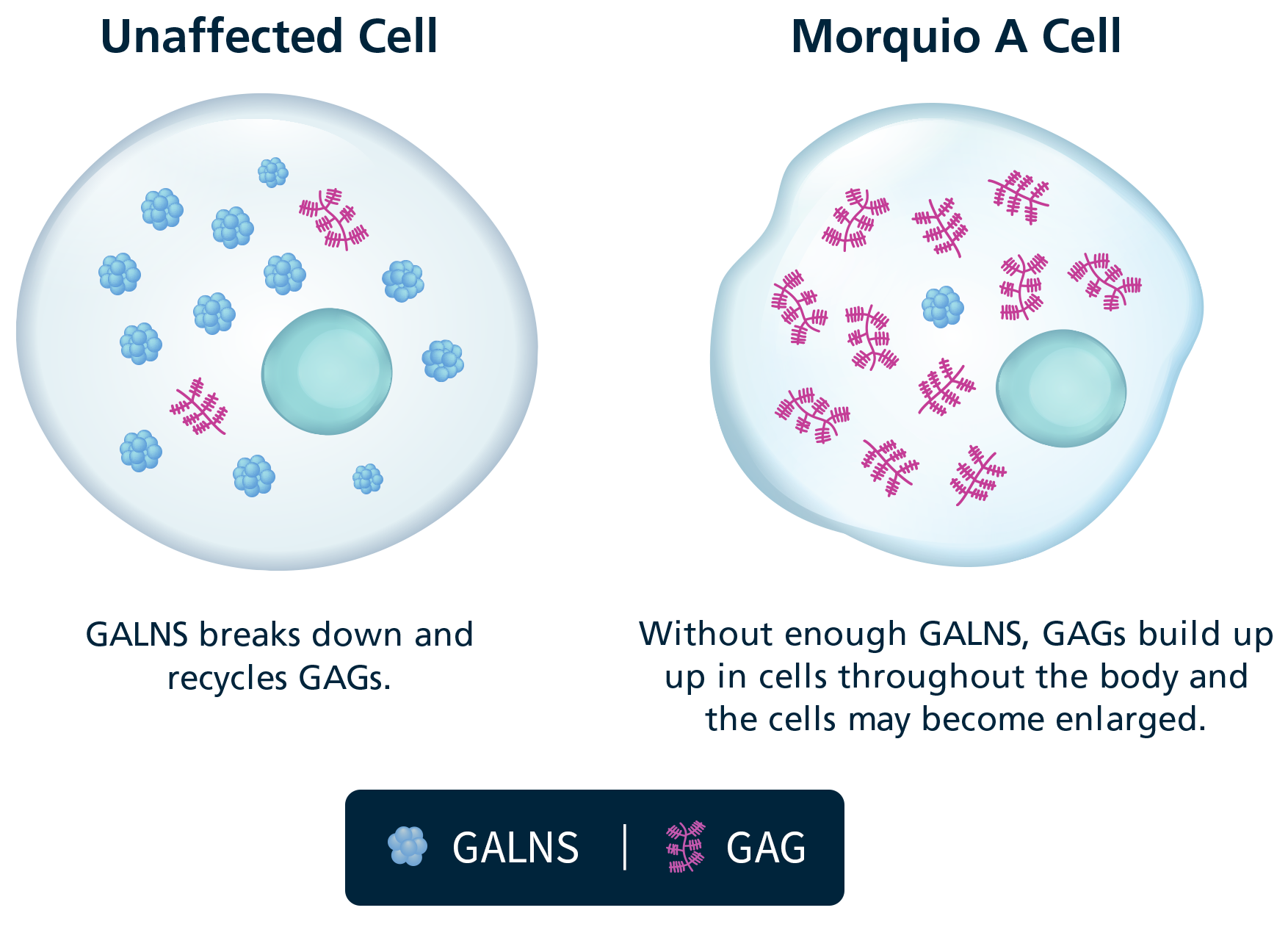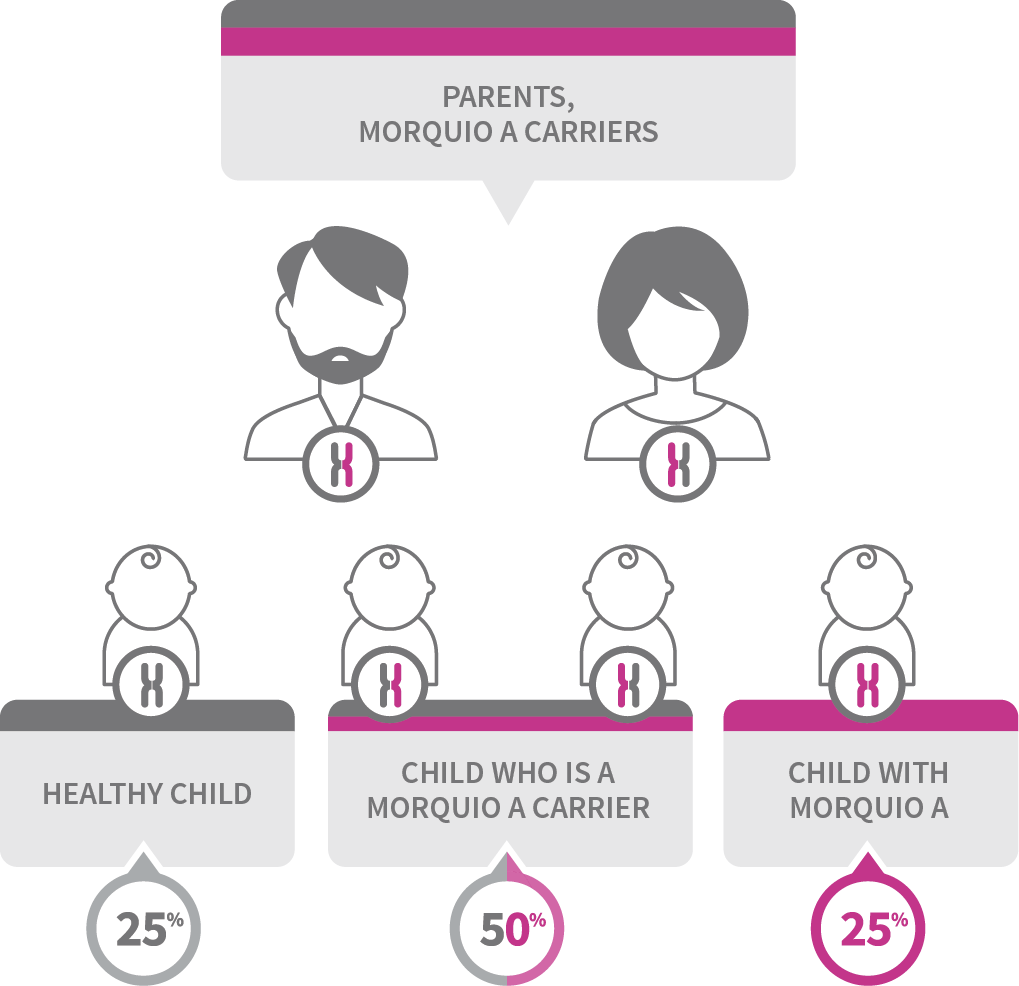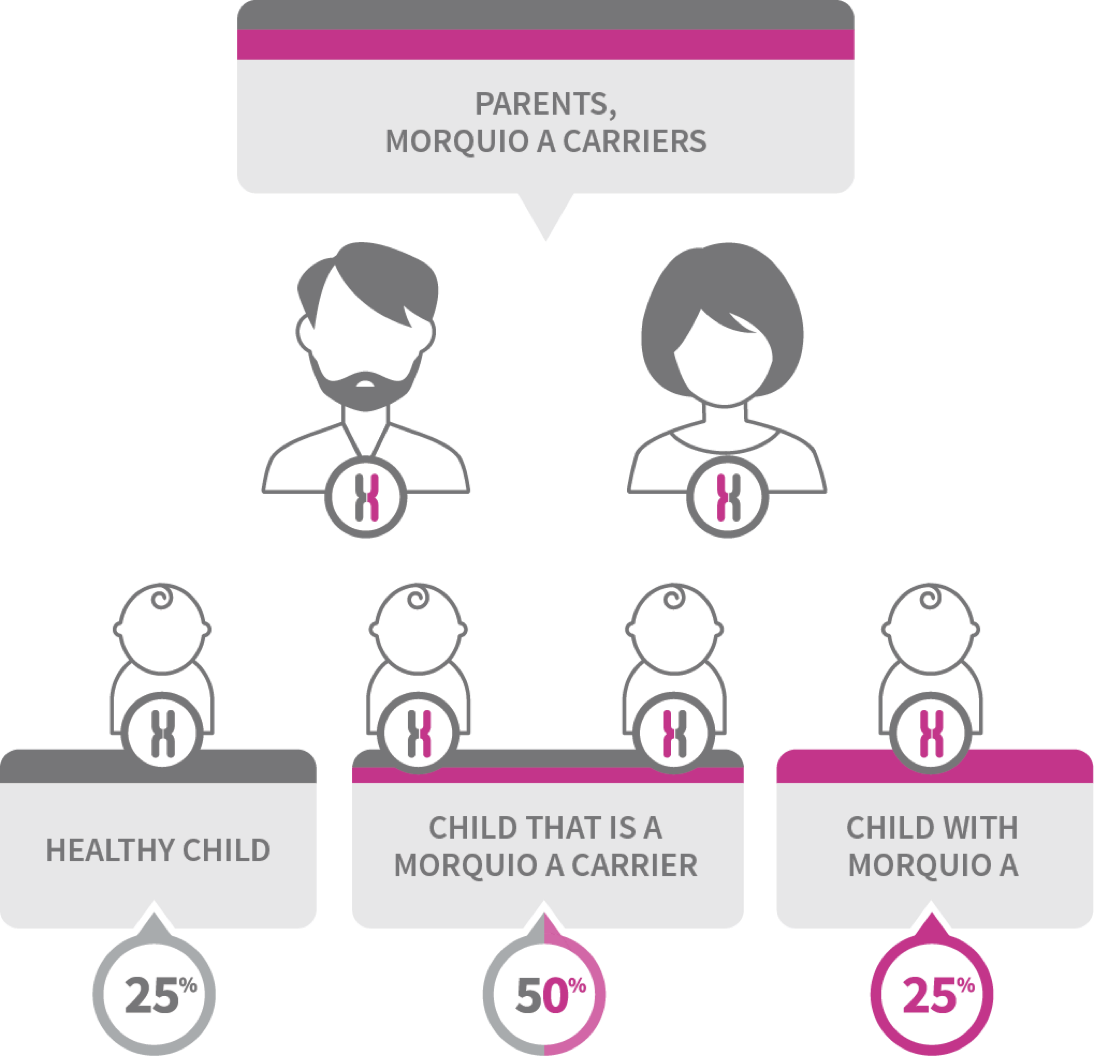INDICATION
VIMIZIM® (elosulfase alfa) is indicated for patients with mucopolysaccharidosis type IVA (MPS IVA; Morquio A syndrome).
IMPORTANT SAFETY INFORMATION
Life-threatening allergic reactions, known as anaphylaxis, can occur during VIMIZIM infusions. Typical signs of anaphylaxis include cough, rash, throat tightness, hives, flushing, changes in skin color, low blood pressure, shortness of breath, chest pain, and gastrointestinal symptoms such as nausea, abdominal pain, retching, and vomiting. Contact your doctor or get medical help right away if these symptoms occur during or after VIMIZIM infusions. If you have a respiratory illness, you may be at risk for a sudden worsening of your condition, and you may require additional monitoring.
VIMIZIM is a prescription medicine. Before treatment with VIMIZIM, it is important to discuss your medical history with your doctor. Tell your doctor if you are sick or taking any medication and if you are allergic to any medicines. Also tell your doctor if you are pregnant, planning to become pregnant, or are a nursing mother. Your doctor will decide if VIMIZIM is right for you. If you have questions or would like more information about VIMIZIM, contact your doctor.
Anaphylaxis can occur during any VIMIZIM infusion, as early as 30 minutes from the start and up to 3 hours after infusion, and as late into treatment as the 47th infusion. Hypersensitivity reactions have been observed as early as 30 minutes from the start of infusion but as late as 6 days after infusion.
Serious and severe reactions can happen with VIMIZIM treatment, including life-threatening allergic reactions (anaphylaxis), hives, swelling, cough, shortness of breath, and flushing. You should receive medication such as antihistamines before VIMIZIM infusions to reduce the risk of reactions. If a reaction occurs, the infusion should be slowed or stopped and you may be given additional medication. If a severe reaction occurs, the infusion should be stopped immediately and you will receive appropriate medical treatment.
If you have acute febrile or respiratory illness at the time of VIMIZIM infusion, you may be at higher risk of life-threatening complications from hypersensitivity reactions. If you use supplemental oxygen or continuous positive airway pressure (CPAP), you should have it available during your infusion in the event of a sudden reaction, or extreme drowsiness/sleep from antihistamines.
Spinal cord damage may occur due to the natural MPS IVA disease process. Signs of spinal cord injury include back pain, numbness and paralysis, and loss of bladder and bowel control. Contact your doctor immediately if you develop any of these symptoms.
The most common side effects reported during VIMIZIM infusions included fever, vomiting, headache, nausea, abdominal pain, chills, and fatigue. These are not all the possible side effects with VIMIZIM. Talk to your doctor if you have any symptoms that bother you or that do not go away.
Call your doctor for medical advice about side effects. You may report side effects to BioMarin at 1-866-906-6100 and the FDA by visiting www.fda.gov/medwatch or calling 1-800-FDA-1088.
For more information, call BioMarin RareConnectionsTM at 1-866-906-6100.
Please see accompanying full Prescribing Information, including important warning.
US-VIM-00085 0323
INDICACIÓN
VIMIZIM® (elosulfase alfa) está indicado para pacientes que tienen mucopolisacaridosis de tipo IVA (MPS IVA; síndrome de Morquio A).
INFORMACIÓN IMPORTANTE DE SEGURIDAD
Durante las infusiones de VIMIZIM pueden presentarse reacciones alérgicas potencialmente mortales, llamadas anafilaxia. Los signos típicos de la anafilaxia son tos, sarpullido, opresión en la garganta, urticaria, rubor, cambios del color de la piel, baja presión arterial, falta de aliento, dolor de pecho y síntomas gastrointestinales como náuseas, dolor abdominal, arcadas y vómitos. Comuníquese con su médico o busque asistencia médica de inmediato si estos síntomas se producen durante las infusiones de VIMIZIM o posteriormente. Si usted tiene una enfermedad respiratoria, tal vez corra el riesgo de que su afección empeore repentinamente y quizás requiera una mayor vigilancia..
VIMIZIM es un medicamento de venta con receta médica. Antes de comenzar el tratamiento con VIMIZIM, es importante que hable de sus antecedentes de salud con su médico. Infórmele si tiene alguna enfermedad o está tomando otros medicamentos, y si le tiene alergia a algún medicamento. Además, dígale al médico si usted está embarazada o planeando un embarazo, o si es una madre lactante. Su médico determinará si VIMIZIM es adecuado para usted. Si tiene alguna pregunta o si desea obtener más información acerca de VIMIZIM, comuníquese con su médico.
Durante cualquier infusión de VIMIZIM puede producirse la anafilaxia, desde apenas 30 minutos después del comienzo de la infusión y hasta 3 horas más tarde, y aún en etapas tan tardías del tratamiento como en la infusión 47. Se han observado reacciones de hipersensibilidad ya a los 30 minutos después del comienzo de la infusión y hasta 6 días después.
El tratamiento con VIMIZIM puede dar lugar a reacciones graves y severas, incluso reacciones alérgicas potencialmente mortales (anafilaxia), urticaria, hinchazón, tos, dificultad para respirar y rubor. Antes de las infusiones de VIMIZIM, usted deberá recibir medicamentos como antihistamínicos para reducir el riesgo de reacciones. Si se produce una reacción, la infusión deberá realizarse más lentamente o suspenderse, y quizás se administre algún otro medicamento. Si se produce una reacción severa, deberá suspenderse de inmediato la infusión y administrarse un tratamiento médico adecuado.
Si tiene alguna enfermedad febril o respiratoria aguda en el momento de la infusión de VIMIZIM, quizás corra un mayor riesgo de presentar complicaciones potencialmente mortales a causa de las reacciones de hipersensibilidad. Si usted recibe aporte complementario de oxígeno o presión positiva continua en las vías respiratorias (CPAP), debe tener dicho tratamiento a su disposición durante su infusión en caso de que se le presente una reacción repentina o le dé somnolencia o sueño extremos por los antihistamínicos.
El proceso patológico natural de la MPS IVA puede dar lugar a lesiones en la médula espinal caracterizadas por dolor de espalda, entumecimiento y parálisis y pérdida de control de la vejiga y del intestino. Si presenta alguno de estos síntomas, comuníquese con su médico inmediatamente.
Los efectos secundarios observados con más frecuencia durante las infusiones de VIMIZIM fueron fiebre, vómitos, dolor de cabeza, náuseas, dolor abdominal, escalofríos y cansancio. Estos no son todos los posibles efectos secundarios de VIMIZIM. Hable con su médico si presenta algún síntoma que le moleste o que no desaparezca.
Llame a su médico para pedirle consejos sobre los efectos secundarios. Podrá notificar los efectos secundarios a BioMarin llamando al 1-866-906-6100, o a la FDA visitando www.fda.gov/medwatch o llamando al 1-800-FDA-1088.
Para obtener más información, llame a BioMarin RareConnections™ al 1-866-906-6100.
Consulte la información completa sobre prescripción que se adjunta, incluida la advertencia importante.
US-VIM-00095 0224




